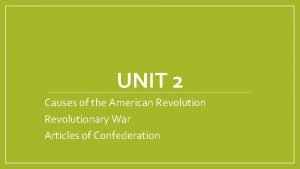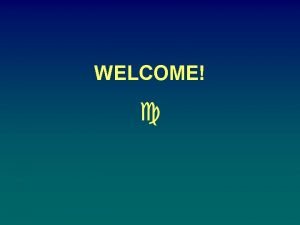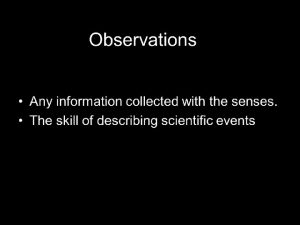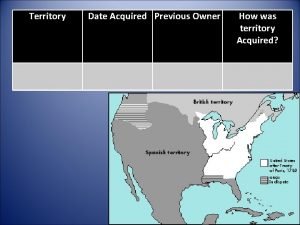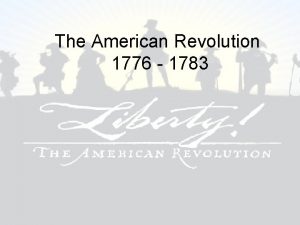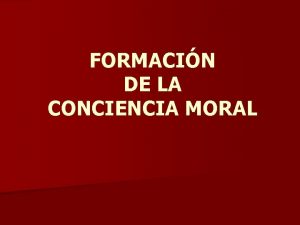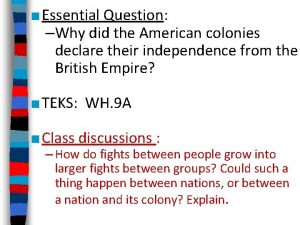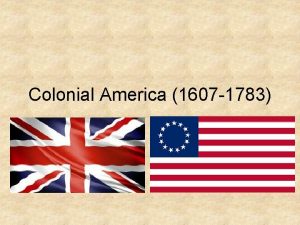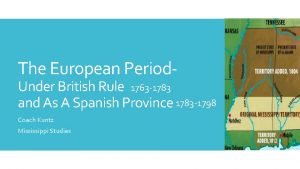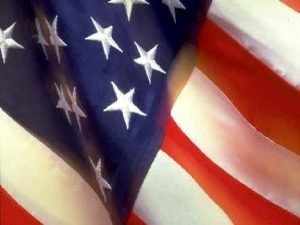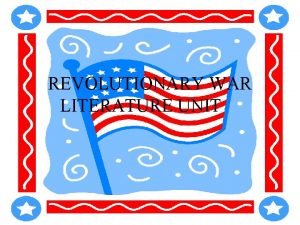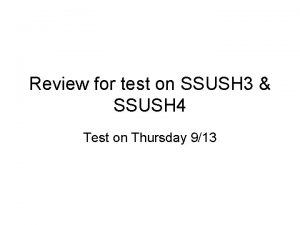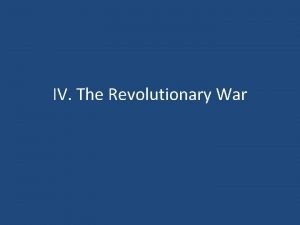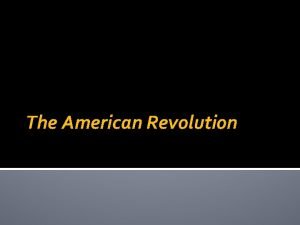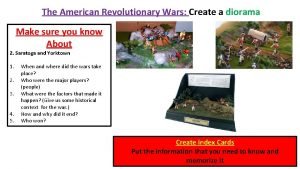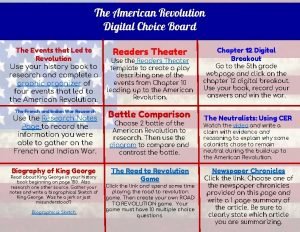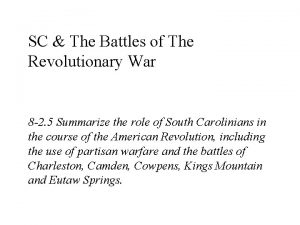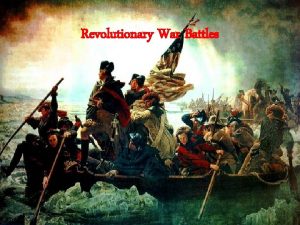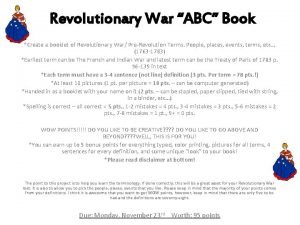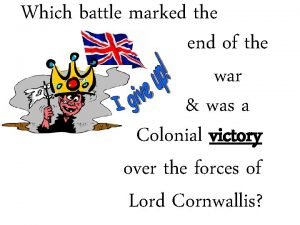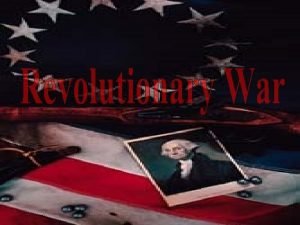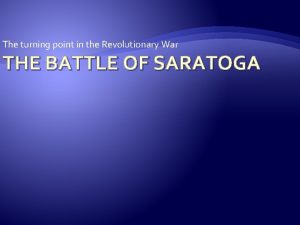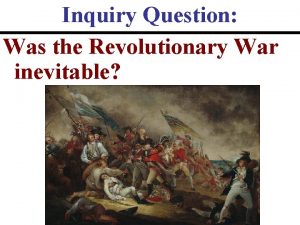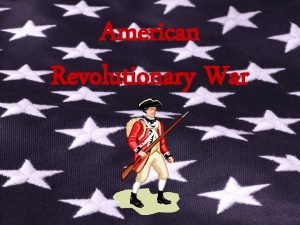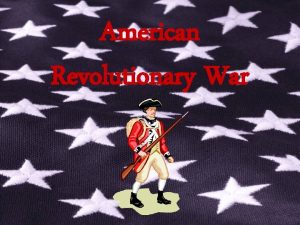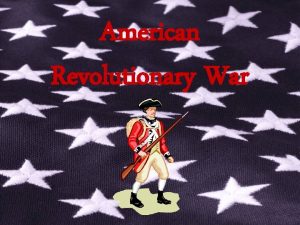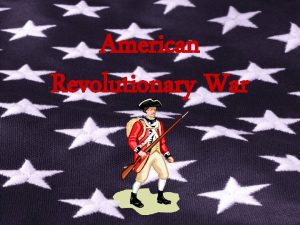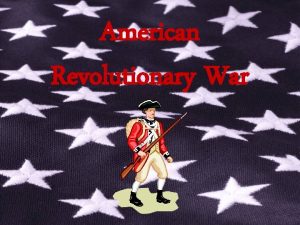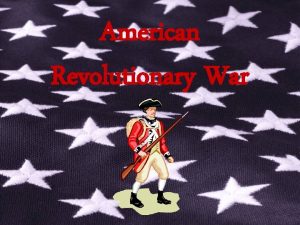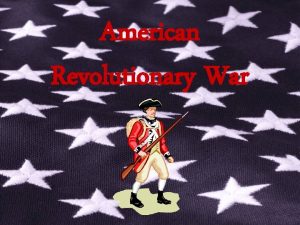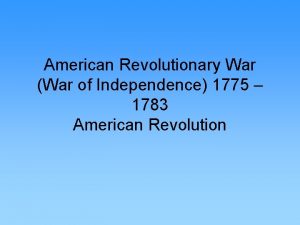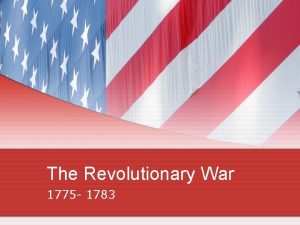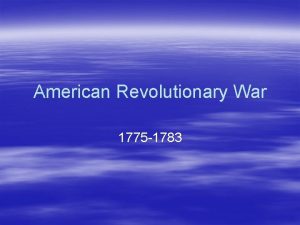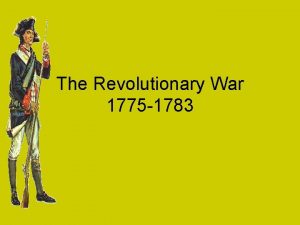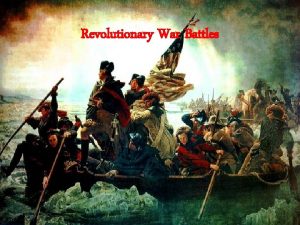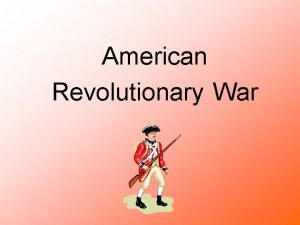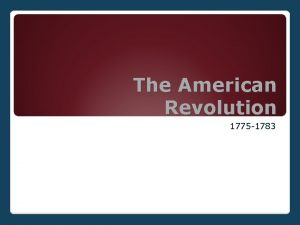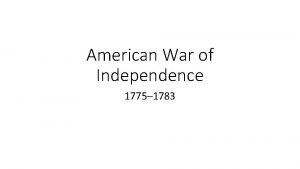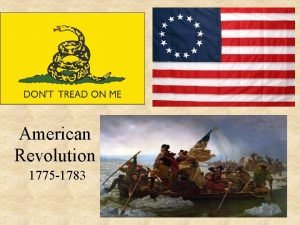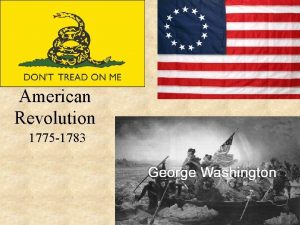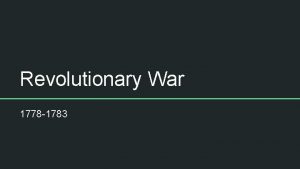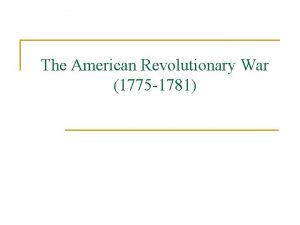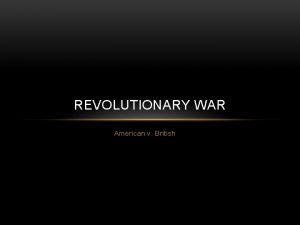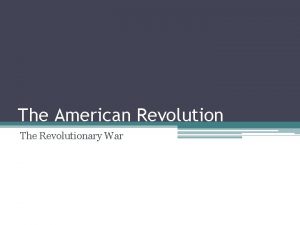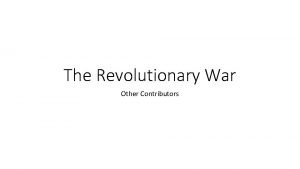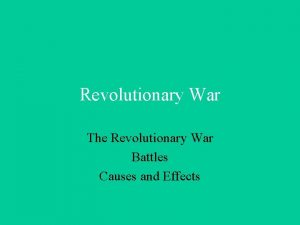American Revolutionary War 1775 1783 4 Pages First




























- Slides: 28

American Revolutionary War 1775 -1783 4 Pages…

First Continental Congress O In 1774 delegates met in Philadelphia to decide O O O O what to do about the situation. 56 delegates including John and Samuel Adams. One delegate wanted to make peace. Patrick Henry said there was no way to avoid a fight. In the end they reached a compromise – They decided to continue to boycott British goods and warned colonial militias to be ready to fight. They sent delegates to the king asking for basic rights. The king refused.

John Adams O Lawyer and politician O Defended British soldiers after the Boston Massacre O Represented Massachusetts in the Congress O Strong supporter for independence

“The British are Coming!” O Local militia members began calling themselves minutemen because they would be ready at a minute’s notice. O Much of the weapons and ammunition were stored in Concord. O A British general decided to go raid the ammunition. O The Sons of Liberty learned of the plan. O Sent men riding ahead to warn the minutemen.

Paul Revere & Wentworth Cheswell O Paul Revere rode ahead to warn the minutemen. O When Wentworth Cheswell heard the shouts he ran to warn others as well. O Many people made rides warning of the British coming.

The “Shot Heard round the World” O The minutemen beat the British to the ammunition. O They decided to make a line at Lexington to stop the British. O The first shot of the Revolutionary War. O The British marched on to Concord, few weapons remained.


Second Continental Congress O In 1775 representatives from 12 colonies met in Philadelphia again. O They had to decide how to react to the fighting. O Congress made plans to create a Continental Army – chose George Washington to command the army. O One last attempt at peace – Olive Branch Petition – King rejected the offer

George Washington O A soldier in the French and Indian War O Delegate to the First and Second Continental Congress O Commander-in-chief of the Continental Army throughout the Revolutionary War

Thomas Paine O Wrote a pamphlet called Common Sense O It was written in common language and distributed throughout the colonies O Urged colonists to break free from Britain

Second Continental Congress O 1776 the Congress created a committee to write a document declaring independence from Britain. O In reaction to King George III’s refusal to acknowledge the colonial requests O John Adams, Benjamin Franklin and Thomas Jefferson were among others in the committee. O Wrote the Articles of Confederation which would serve as a new form of government for the young country.

Thomas Jefferson O A delegate to the First and Second Continental Congress O A member of the committee to write the Declaration of Independence O Primary author of the Declaration of Independence

Declaration of Independence O July 4, 1776 O “All men are created equal” O Discussed unalienable rights – which are basic rights guaranteed to people naturally O These rights included – life, liberty, and the pursuit of happiness O Listed grievances against the King of England

Grievances listed in the Declaration of Independence O Taxation without representation O King has absolute power O Colonists not allowed to speak out against King O Quartering Act forced colonists to house troops O Allowed homes to be searched without a warrant O No trial by jury of peers

Abigail Adams O Wife of John Adams O Served as his support and confidant O Reminded John to “remember the ladies” who had no political voice

Choosing Sides O Patriots – fought for independence from Britain O Loyalist/Tories – remained loyal to Britain O Neutrals – chose neither side

Washington Crossing the Delaware. (Battle of Trenton)

Battle at Sea O John Paul Jones O Considered the founder of the U. S. Navy O Led raids on British vessels during the American Revolution

Saratoga O Considered a major turning point of the war O France joined the colonists after this battle. O This tipped the scale in favor of the colonists

Benjamin Franklin O He spent most of the Revolutionary war in France O He represented the colonies O He negotiated an alliance with France O He negotiated the Treaty of Paris which ended the war

Winter at Valley Forge O After suffering several defeats, Washington took his army to Valley Forge for the winter of 1777. O Many of the men suffered frostbite and starvation O The men were trained by a Prussian officer into a more professional army.

Help From Other Countries

Bernado de Galvez O Spanish nobleman and governor of the Spanish province of Louisiana O Protected American ships in the port of New Orleans O Helped transport war supplies O Took up arms and fought to protect Louisiana

Marquis de Lafayette O From France O Fought in the American Revolution O Commanded forces as a majorgeneral in the colonial army O Fought in the Battle of Yorktown

James Armistead O A slave in Virginia O Marquis de Lafayette recruited him as a spy for the Continental Army O Contributed to the victory at Yorktown

Haym Salomon O Jewish immigrant to America O Helped finance the Revolutionary War O Arrested by the British as a spy O Used by the British as an interpreter for their German troops O Helped American prisoners escape and encouraged German soldiers to desert the British army O Was a business man who helped with the finances of the war.

Victory at Yorktown O Final battle of the Revolutionary War O The battle lasted for weeks O The surrender of General Cornwallis brought an end to the war

Treaty of Paris 1783 O Independence formally recognized by Britain O New borders established O North to Canada O West to the Mississippi River
 10 causes of the american revolution
10 causes of the american revolution Battle of lexington and concord winner
Battle of lexington and concord winner Printed pages vs web pages
Printed pages vs web pages 1806 valentin ross
1806 valentin ross Previous owner of texas
Previous owner of texas Catecismo de la iglesia 1783
Catecismo de la iglesia 1783 Us in 1783
Us in 1783 Catecismo de la iglesia 1783
Catecismo de la iglesia 1783 Us in 1783
Us in 1783 1783-1607
1783-1607 Under british rule, 1763-1783
Under british rule, 1763-1783 Treaty of paris 1783 apush
Treaty of paris 1783 apush Music of the revolutionary war
Music of the revolutionary war Revolutionary war literature
Revolutionary war literature King of england during revolutionary war
King of england during revolutionary war British weaknesses in the revolutionary war
British weaknesses in the revolutionary war Lemuel hayes revolutionary war
Lemuel hayes revolutionary war Boston tea party diorama ideas
Boston tea party diorama ideas American revolution digital breakout answers
American revolution digital breakout answers Kings mountain battle map
Kings mountain battle map Fort ticonderoga map location
Fort ticonderoga map location Revolutionary war abc book
Revolutionary war abc book Revolutionary war
Revolutionary war What were the british strengths and weaknesses
What were the british strengths and weaknesses Revolutionary war interactive notebook
Revolutionary war interactive notebook Which battle
Which battle British strengths during the revolutionary war
British strengths during the revolutionary war Turning point of the revolutionary war
Turning point of the revolutionary war Inquiry answer 12
Inquiry answer 12
